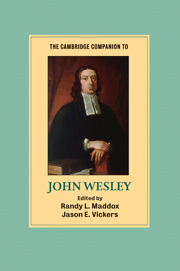Book contents
- Frontmatter
- Introduction
- Part I Wesley’s context
- Part II Wesley’s life
- Part III Wesley’s work
- 4 Wesley as revivalist/renewal leader
- 5 Wesley as preacher
- 6 Wesley as biblical interpreter
- 7 John Wesley as diarist and correspondent
- 8 John Wesley as editor and publisher
- 9 Wesley’s engagement with the natural sciences
- 10 Wesley as adviser on health and healing
- 11 Wesley’s theological emphases
- 12 Happiness, holiness, and the moral life in John Wesley
- 13 Wesley’s emphases on worship and the means of grace
- Part IV Wesley’s legacy
- Select bibliography
- Index
9 - Wesley’s engagement with the natural sciences
from Part III - Wesley’s work
Published online by Cambridge University Press: 28 September 2010
- Frontmatter
- Introduction
- Part I Wesley’s context
- Part II Wesley’s life
- Part III Wesley’s work
- 4 Wesley as revivalist/renewal leader
- 5 Wesley as preacher
- 6 Wesley as biblical interpreter
- 7 John Wesley as diarist and correspondent
- 8 John Wesley as editor and publisher
- 9 Wesley’s engagement with the natural sciences
- 10 Wesley as adviser on health and healing
- 11 Wesley’s theological emphases
- 12 Happiness, holiness, and the moral life in John Wesley
- 13 Wesley’s emphases on worship and the means of grace
- Part IV Wesley’s legacy
- Select bibliography
- Index
Summary
Among the many topics that could be included in a Companion to John Wesley, readers might be surprised to find a chapter devoted to Wesley's engagement with the natural sciences. Or, based on some influential precedents, they may anticipate an exposé of Wesley's opposition to scientific theories and reasoning. Over a century ago, in his History of English Thought in the Eighteenth Century (1876), Sir Leslie Stephen contended that “we already find in Wesley the aversion to scientific reasoning which has become characteristic of orthodox theologians” (2:412). Andrew Dickson White echoed this evaluation twenty years later in his (in)famous History of the Warfare of Science with Theology in Christendom (1896). One shortcoming of these critiques of Wesley is that they relied mainly on secondary sources and passing comments in his Sermons and Journal. As a result, they provide little sense of the scope of Wesley's interest in and publications about the natural world. In 1763, Wesley issued for the benefit of his Methodist people A Survey of the Wisdom of God in Creation; or, A Compendium of Natural Philosophy, a two volume work distilling his reading of several book-length works as well as extracts from the Philosophical Transactions of the Royal Society for the Improvement of Natural Knowledge and other journals.
- Type
- Chapter
- Information
- The Cambridge Companion to John Wesley , pp. 160 - 175Publisher: Cambridge University PressPrint publication year: 2009



